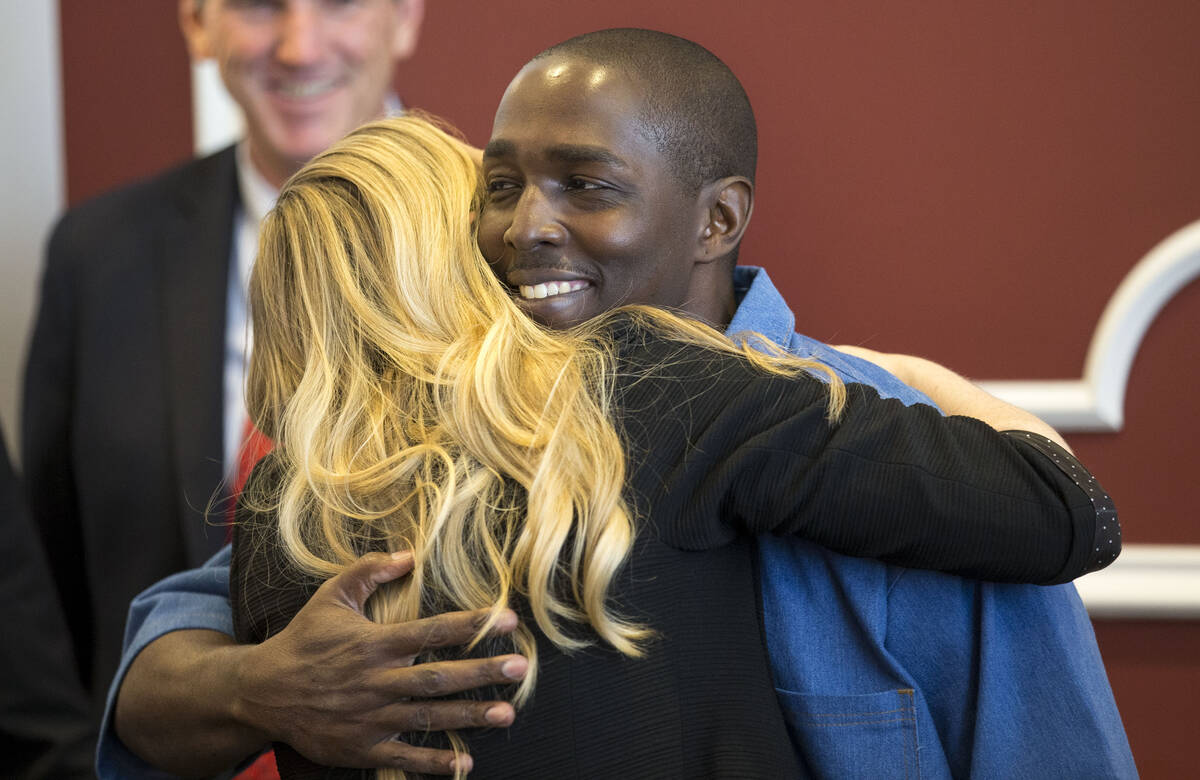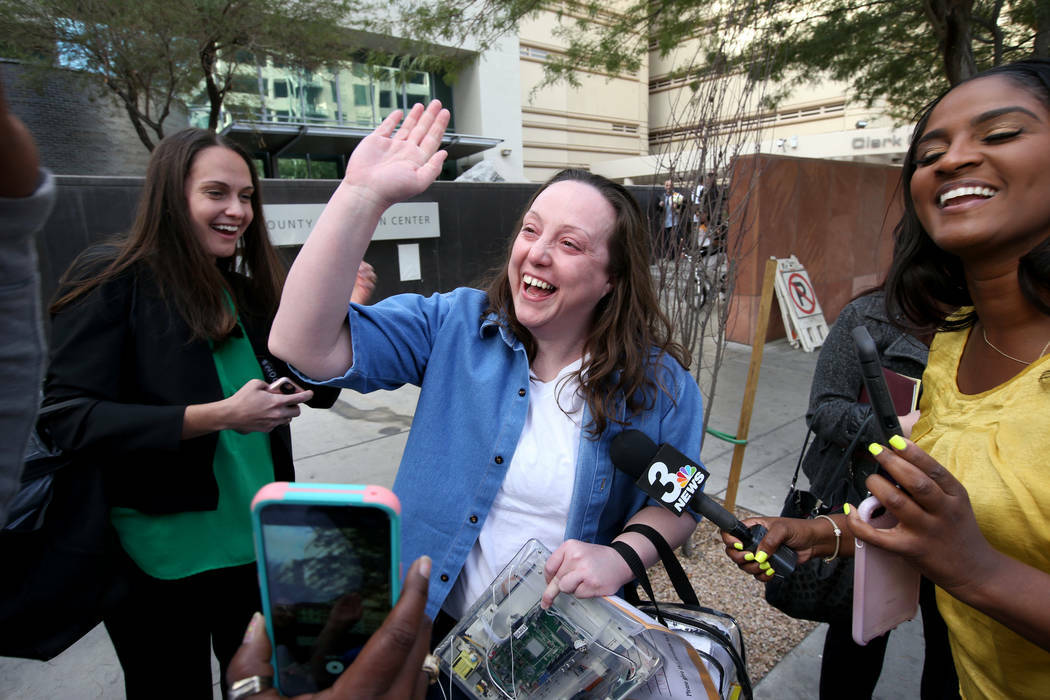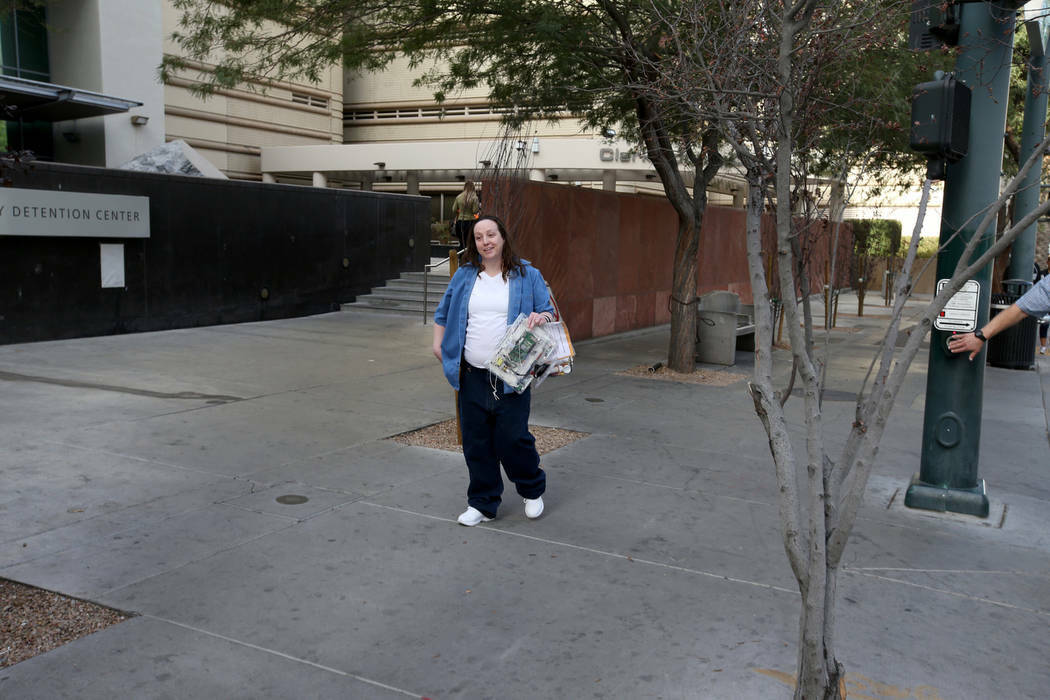A question of innocence: How Clark County prosecutors review convictions
A special unit of the Clark County district attorney’s office that seeks to correct wrongful convictions has produced one felony exoneration in the six years since it was created.
Meanwhile, during the same time span, other lawyers in Southern Nevada have obtained five felony exonerations — most of them in murder cases.
The convictions vacated through the work of private lawyers include the high-profile homicide case of Kirstin Lobato. The district attorney’s conviction review unit, also known as a conviction integrity unit, was asked to review the case but declined.
But experts say the success of conviction review units should not be judged solely by the number of exonerations they have had.
“If you’re just looking at exonerations, you’re looking at such a small metric that you’re really risking the entire story of what’s really going on,” said Marissa Bluestine, of the Quattrone Center for the Fair Administration of Justice at the University of Pennsylvania’s Carey School of Law.
The center provides training and support for conviction review units around the country.
“Exonerations take time,” Bluestine said. “And a whole host of factors have to fall in line.”
Transparency, independence, flexibility
Bluestine said three key metrics for evaluating a conviction review unit are transparency, independence and flexibility: “Is the unit operating in a transparent manner? Is the unit independent? Do they have good communication, and are they flexible?”
She noted that Clark County’s unit has no obvious web presence.
“So there’s no way for the public to understand what’s happening,” Bluestine said. “There’s no way for somebody who wants to receive assistance to find out how to do that, so it’s not a transparent process.”
Bluestine said district attorneys’ offices also should be producing an annual report for the public on the work their units are doing, but when the Las Vegas Review-Journal requested annual reports from the Clark County district attorney’s office regarding its unit, no reports were provided.
The office also has not issued a news release about the unit’s work since 2017, when DeMarlo Berry, whose murder case was submitted to the conviction review unit by the Rocky Mountain Innocence Center, was exonerated.
By the numbers
Though the Clark County district attorney’s office did not respond to a request for an interview, the office did provide a spreadsheet listing 231 cases that had been referred to the unit as of August. A small portion of those cases were submitted by criminal defense lawyers or innocence organizations, and few were accepted for re-investigation. The spreadsheet did not include five misdemeanor exonerations.
The data showed that 120 of the requests came from prison inmates themselves, and all of those were denied. An additional 72 submissions were made by the district attorney’s own appellate division. In an email, Assistant District Attorney Christopher Lalli said that the appellate division forwards cases to the unit when the habeas petition, which challenges the constitutionality of some aspect of the prisoner’s conviction or sentence, claims actual innocence. All of those cases were denied.
Then there were 70 cases marked “application pending.” According to Lalli, these were cases where an application for review was requested and sent to the requestor, but was never received back.
Of the 231 cases listed on the conviction review unit spreadsheet, which dates to 2016, the unit has approved three. One resulted in a sentence reduction in a murder case. In another case, a man who pleaded guilty to violating his lifetime supervision had that conviction vacated. The third case was the DeMarlo Berry murder exoneration.
Berry’s conviction was overturned in 2017 after another man serving a life sentence in California for a different murder confessed to the crime. Berry became the first person to receive a certificate of innocence under a 2019 state law that affords compensation to people wrongfully convicted in Nevada.
Rejected cases
Following the submission of the Berry case to the conviction review unit, the Rocky Mountain Innocence Center submitted two additional cases.
One was the case of Todd Beverly, who was sent to prison after being convicted of sexually assaulting his stepdaughter when she was a child. The second involved Ashley Bennett, a man convicted of murder in 2002.
Beverly was paroled after serving 20 years in prison. He has always maintained his innocence, and the alleged victim long ago recanted.
The woman gave emotional testimony last year at a parole hearing for Beverly, who is now 62.
“How can I be a victim to a crime he never committed?” she asked. “I’ve fought this for 20 years.”
Bennett, now 48, is serving a life sentence in Nevada but is seeking exoneration after two witnesses recanted and a third witness said Bennett wasn’t involved in the killing.
When these cases were submitted to the conviction review unit, the response was not the same as in Berry’s case.
“Unfortunately, both were rejected by the CRU,” said Jennifer Springer, an attorney for the Rocky Mountain Innocence Center. “We are very disappointed in these outcomes, but we will continue to advocate on behalf of these clients in hopes of securing a finding of innocence.”
Though both men are pursuing a finding of innocence in court, neither Bennett nor Beverly has been exonerated. That’s especially problematic for Beverly because the law prevents him from having contact with his stepdaughter while convicted, though she wants to be close to him and swears her allegations were false.
“No one is getting justice here,” Springer said. “Even the victim.”
In the four years since the Beverly and Bennett cases were rejected, the Rocky Mountain Innocence Center hasn’t submitted another case to Clark County’s conviction review unit.
Asked if the center had stopped submitting cases because of those 2018 rejections, Springer would say only: “I don’t want to go there.”
But Springer said she’s hoping to maintain a good working relationship with the unit to help bring more innocent people home.
“Going through a conviction review unit can often bring them home faster,” she said.
The district attorney’s office said it did not have any documents indicating why the unit rejected the Bennett murder case. As for the Beverly case, the unit’s chief, Dan Silverstein, noted in an email to one of Beverly’s lawyers that his unit requires new, potentially provable evidence to proceed.
Silverstein wrote in the email that the stepdaughter’s recantation “is not ‘new evidence capable of being investigated and substantiated.’”
New evidence that can be substantiated is one of the criteria used by the conviction review unit to decide whether to accept a case, and it is stated on the application form filled out by anyone hoping to have their case reviewed.
The unit rejected Lobato’s case after it was submitted by Las Vegas attorney David Chesnoff and the New York Innocence Project. The woman was released from custody in January 2018 after spending more than 15 years behind bars for the killing of a homeless man whose penis was severed.
Lobato had professed her innocence and appealed her case for years, twice winning new trials.
“Consistent with the conclusion reached by our Conviction Review Unit, no Nevada court which directly handled Lobato’s criminal case concluded she was actually innocent of the charge,” Lalli wrote in a September email to the Review-Journal. “After the conviction was set aside for a second time — the first based upon judicial error and the second for ineffective assistance of counsel — the State made the decision not to try the case for a third time.”
Preventing wrongful convictions
Though news media often focus on exonerations, Bluestine said some of the most important work of a conviction review unit is to help ensure that the right culture prevails in the justice system — “internal changes to policy and procedure that can prevent people from being convicted in the first place.”
Among those changes: getting police to adopt the best practices for eyewitness identification and for use of informants and interrogation techniques.
“With issues of confessions, trying to encourage police to use forms of interrogation which don’t yield false confessions but in fact give you more information about a case than what you had,” Bluestine said.
And it may be difficult to determine how well Clark County’s conviction review unit is performing without more effective communication.
“Because transparency is one of the biggest factors that people should look at in terms of whether their unit is a sincere unit or not,” Bluestine said. “The community has a right to know what’s going on in that unit.”
Contact the Review-Journal at metroeditors@reviewjournal.com.
























